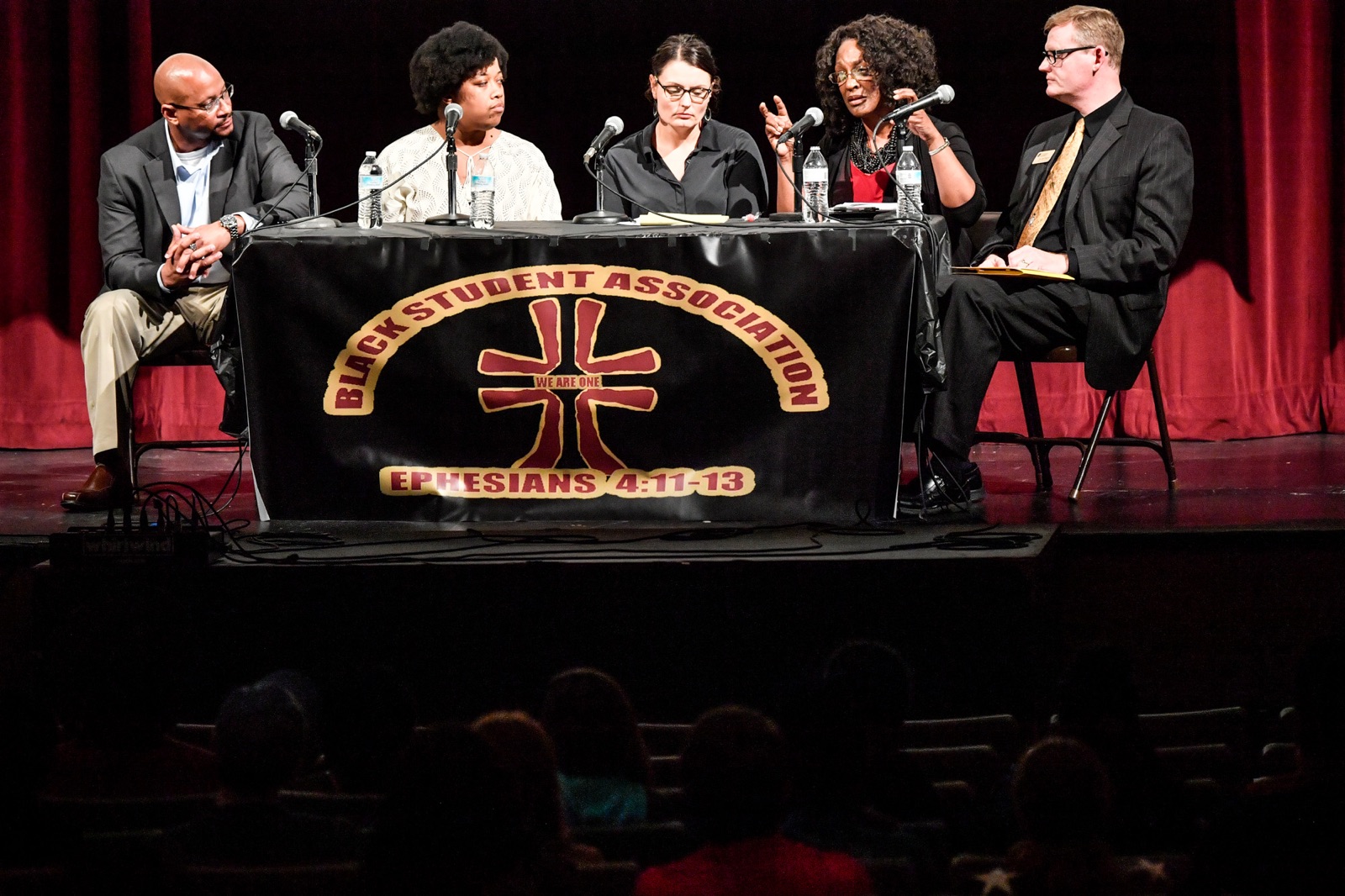 March 12, 2017 |
Student Organizations
|
March 12, 2017 |
Student Organizations
|
Harding University’s Black Student Association held a panel discussion in recognition of Black History Month titled, “Race Relations: It’s not my fault, but it is my problem” on Friday, Feb. 24.
“Black History Month raises the consciousness of the nation of the positive contributions of African Americans in the past, in the present and in the future,” Associate Professor of Education Carol Douglass said. “It raises the level of awareness for a new generation of people of color.”
Douglass, the director of special education, was one of five panelists who gave insight on the impact of black history in their own lives as well as their experiences in dealing with racism. Other panelists included Assistant Professor of Bible Tim Westbrook, Assistant Professor of English Amy Qualls, counselor and alumna Briana Cunningham, and president of National Association for the Advancement of Colored People Arkansas Chapter Rizelle Aaron.
Junior Molly White said attended the panel and said she learned a great deal from the various perspectives of the panelists about black history month.
“The panelists explained that there is little recognition for success of black men and women in America, and during February, they finally get the recognition and appreciation they deserve,” she said. “White men and women are praised and recognized throughout the year while it’s still a problem in textbooks for men and women to be recognized as black with their achievements.”
The panelists were led in a discussion about the importance of black history and of diversity on college campuses by junior Jewels Edmerson, president of the Black Student Association. Edmerson said that through the event, BSA hoped to inform people about what happens when there is a lack of diversity and cultural awareness within student bodies.
“In terms of focusing on diversity and why we need diversity here at Harding, that was accomplished through this event,” Edmerson said. “It was a good event to get people excited. We want everyone to join BSA just to hear issues from the black perspective. Harding is ready for a change, and it’s a perfect time for us all to be here and start working toward this goal.”
The purpose of the BSA is to promote leadership, cultural awareness, understanding, and appreciation of black cultures within the student body at Harding University and to enrich the lives of students on personal, academic, social, and spiritual levels. Cunningham addressed how diversity impacts our lives and how it should be viewed on campus.
“Just because we have a mixture of people on campus does not mean that we are diverse because true diversity is about fellowship,” Cunningham said. “If I learn about you, you learn about me, and we learn to relate to each other as fellow human beings on this earth, then and only then will we have true diversity.”
“When universities diversify, they create new spaces for idea exchange and social improvement and for barriers to be torn down that separate races and social classes,” Westbrook said. “If race is a barrier to education, then we must tear down that wall and create learning spaces that prepare students for the future and that gives us a chance as a Christian institution to influence the future with biblical and Christian values. A healthy, diversified college is one in which all people can thrive in their own skin, earn the credentials they need for the next curve, and find spiritual enrichment and a stronger faith along the way.”
Sophomore Makayla Twig felt that for the BSA’s first event, students responded well, and the event was a great start to having more conversations and gaining more perspectives.
“It wasn’t just black people in the crowd, which I think is very important because the issue of lack of diversity affects all of us — not just one group,” she said. “The mix of different backgrounds and experiences on the panel are what I think made it so effective and well received; we got to see multiple sides and points of view.
Twigg said she hopes people will be more open to having conversations and learning more about people — “not just to people that look like us but to everyone.”
“Once we start having these kinds of conversations with each other and addressing what the problem is, the easier it will be for us to work together toward a solution. I hope the event helped people realize how important diversity on our campus truly is and how much you can learn and be educated from other people.”